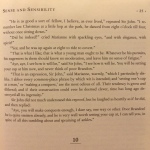Jane Austin is an author I have only met once or twice before. She bored me the first time around, and it has taken me awhile to find the right footing on this latest meeting. The omnibus collection I’ve gotten myself into begins with Sense and Sensibility.
At first I was not impressed. I was against the author for dealing solely in world of the affluent, and for ignoring completely the world at large. It is true that the Dashwoods are not the most affluent in their world, but they are comfortably secure in their income, and their prime concern is whether or not the unmarried and eligible among them will soon be married, and of course to whom.
When I first dove into the pages I thought, If I were to name this novel back in the day I would call it ‘First World Problems: The Movie,” thankfully I didn’t name the novel, and thankfully I didn’t let my bias ruin the novel outright. It took some commitment on my part to let the story unfold before me.
Austin’s style is difficult for me because her narrator reduces complex actions to dull and ambiguous description, like for example when she writes, “The morning was rather favourable, though it had rained all night, as the cloud were then dispersing across the sky, and the sun frequently appeared” when describing a day at the park. You see I’m use to deeper descriptions, and a little more active too, but once you get use to it you can allow your imagination to take up the slack.
My objections were considerable, and then I met her characters in dialogue!
Here you catch a glimpse of Marianne, the youngest of the Dashwood women, and you can see that Austin loves her characters. Here Marianne is doing what she always does, caring a great deal about a thing that no one else would, and she’s quite a hipster about it too in a more modern sense as she’s pretty much saying, “Oh, that’s so unoriginal!”
This is where I start to not just appreciate, but enjoy the book. There are modern themes in here, there is so much comedy in here also. Austin doesn’t agree with any of her characters wholly, instead she’s fitted a quality to them and set them against each other. Every character in here has a foil, and every foil runs into her or his other half frequently, and often their interactions are fucking hilarious.
The last thing I will share with you is this. Sometimes my brain works fast, and it can see things quickly and clearly… other times it works more slowly. This is a case where my brain was lagging. I have only now begun to understand the title Sense and Sensibility. Marianne and Willoughby are Sensibility, because they are driven by their sensibilities or personal tastes, aesthetics, and moods. Conversely, Elinor and Brandon are Sense. They are more mature in the way the perceive and process the world, they move slower than the other two, but more steadily and less erratic. Together these foils are Sense and Sensibility. If I were a smarter man I would have seen that instantly, but I wasn’t even looking. Turns out I have a lot to learn from Austin.


You are a courageous person to brave the pen of Austen. For me, there are a few authors I’ve met that I just cannot read, and Austen is one of them. Still, quite a fantastic review!
LikeLiked by 1 person
First of all, thanks for taking the time to chat with me. I really appreciate it, and second, as I said Austen took a bit of commitment on my part, and eye looking for something to like and appreciate. I don’t know if I’ll finish the rest in the collection, but Sense and Sensibility I will, and along the way I will learn all I can.
“You are a courageous person to brave the pen of Austen.”
^^^funny
I bet Austen would have appreciated your wit!
LikeLike
When I read it, I never thought the Dashwoods were affluent; they lived in a cottage. Maybe years and years of Austen brainwashed me?
If Elinor and Brandon are sense, and Marianne and Willoughby are sensibility, I wonder where that leaves Edward Ferrars.
LikeLiked by 1 person
Well, there is a stark difference between the Dashwoods, and say Oliver Twist or Huck Finn, but you are right. They are not the 1% either. I think if I had to place them they would be Lower middle class, or maybe middle class, but they are not working poor, and they don’t seem in danger of falling from their station.
Austen is intelligent and I would not put it past her to throw whatever hurtle at them she thought would best illustrate her point.
As for your last question, there is much more story left ahead of me.
I get the feeling that these are roads well worn and travelled by you. Let me ask you a question then. When/if you were to sit down to read you favorite Austin novel again, what would you be most excited to re-experience or relive? Because, I think, for you that would be the “heart” of Austin, and I would look for it in my own exploration.
And no, you couldn’t be brainwashed by Austen. When I read her I get a sense of her humor and cleverness, I don’t think she meant to brainwash you, but maybe entertain and educate you. I could see that.
Thank you for taking the tie to write, and if you wouldn’t mind letting me know what you think about Edward Ferrars and where he falls in the spectrum between Sense and Sensibility that would be great! 🙂
David
LikeLiked by 1 person
Oh, no, Austen never meant to brainwash anyone, I’m sure, but it’s very easy to assume that only one servant = dirt poor without historical context, which I only started studying when I got older.
Well, my favorite novel is very hard to choose, but if I had to pick one, it would probably Northanger Abbey and the witty conversation. 😀
Thanks for the reply! Edward Ferrars is very indecisive and almost weak-willed–and I don’t mean that as an insult; it’s quite refreshing to have sympathetic male characters with those traits. He made a rash decision in his youth, and he makes a rash decision in the present, but it is indisputably the moral choice. Edward is pure sensibility tempered with sense, I think. In the end, he always follows his heart; sometimes it works out, and sometimes it doesn’t.
LikeLiked by 1 person
That’s one thing I noticed about her stories too, with regards to what you wrote about Edward, her characters often face their past in their present. Which seems to ask the question, are people capable of learning from their pasts, or do they repeat without thought.
Thank you for your comments. I will keep you and what you’ve said in mind as the story continues.
Unfortunately Northanger Abbey is not included in my collection :(, but acquiring books is a true vice that I am proud to admit.
Have a good one and thanks again!
LikeLiked by 1 person
Re: Characters facing their pasts with their present
In all my years of reading Austen, I’ve never noticed that theme. It makes me want to reread them.
If you like Kindle, you can probably get it for free, it being public domain.
LikeLiked by 1 person
Your enthusaism is viral!
Thanks for the tip on the Kindle
LikeLiked by 1 person
So (literally) thoughtful. =) I appreciate how you hung in there with her to the point of discovering not only what she meant by the title but how your own brain engages the movement of stories. A fine excavation.
HW
LikeLiked by 1 person
Full disclosure, it wasn’t completely noble on my part. Jane Austen’s got mass appeal, to be sure, and as someone who hopes to make a living writing someday I mostly sat down with her to steal trade secrets if I was sharp enough to see them!
You ever read her?
PS- you’ll be happy to know that the next few chapters have been enjoyable to read btw. 🙂
LikeLike
Yes, have read her. =) As for the trade secrets…there is nothing new under the sun. It’s how we each spin it.
LikeLiked by 1 person